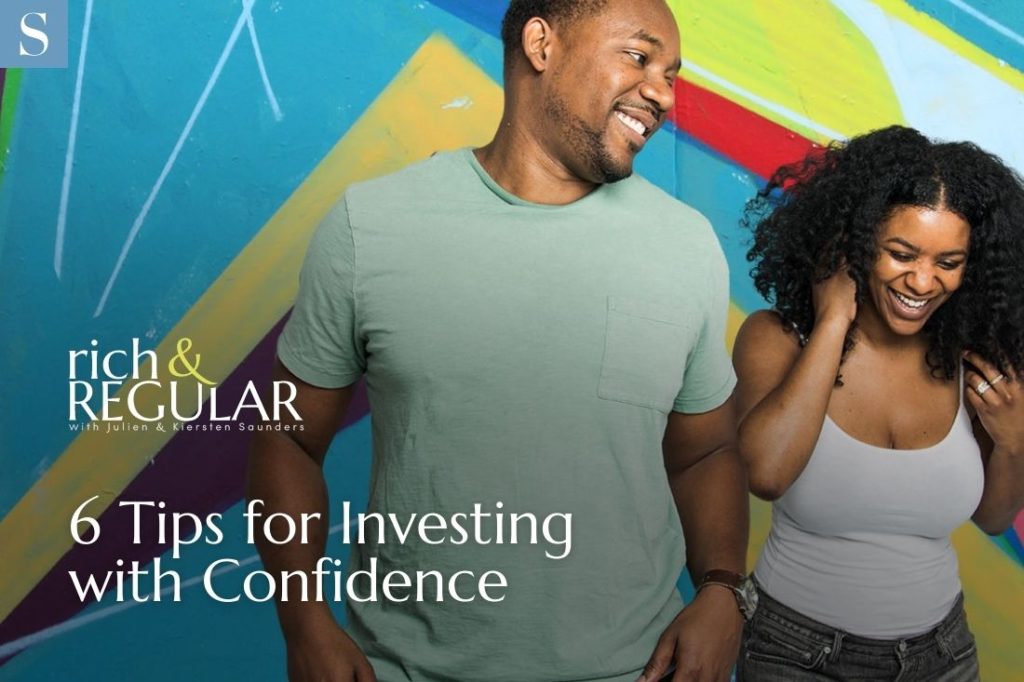You know that investing money now will be good for your financial future, but it can be challenging to find the confidence to get started. Many people want to begin investing or build on their company retirement plans but get stalled out because they think they don’t know enough or need to do tons of research before they start investing.
According to a NerdWallet survey, only about 56% of Americans say they invest in the stock market, and only 44% of women say that they invest. You probably already know that participating in the stock market is vital to your financial future, and one of the easiest ways to get started is to start small and get curious about learning the system.
Rich & REGULAR with Kiersten and Julien Saunders is no longer releasing new episodes on the SUCCESS Podcast Network, but you can still listen to the full conversation below.

Get curious
If you’re a frequent listener to our podcast, you probably know that we encourage everyone to consider responsibly investing in the stock market to help them reach their long-term financial goals. Many people know that investing beyond their company-sponsored retirement accounts is essential, but the pressure of figuring out the single best path can lead to severe analysis paralysis.
Instead of freezing up whenever the talk turns to index funds, money market accounts or exchange-traded funds, research the details of your accounts and get curious about the investing world. Keep in mind that you don’t have to learn everything before you get started, and you don’t have to invest your entire life savings in one go. As you begin to investigate the world of investing, consider the following:
Educate yourself
When you receive and review your quarterly or annual account statements, get curious about the entire report, not just the portfolio value at the end. Start to ask yourself if you understand what each section means. If not, do some research to learn the terminology and why your portfolio looks the way it does.
The investing space has a variety of content creators (like us!) that provide information via books, podcasts or blogs, and they can help you get more comfortable with the idea of investing for the long haul.
Additionally, companies such as Vanguard and Fidelity have educational articles, glossaries and calculators on their sites that can aid you in understanding and gaining familiarity with investing terminology.
Have a weekly check-in
Consider setting a weekly date with yourself to check in on the state of your finances and review what you’ve learned from the previous week. Many people do this to ensure there aren’t any unauthorized charges or to confirm their bank balance, but adding just a few minutes to this check-in time allows you to review what you’ve learned about investing as well as see and measure your progress.
Often when we’re in the middle of learning something new, all we can focus on is what we still don’t know. This weekly check-in lets you see how far you’ve come in your investing journey and gives you time to course-correct if you aren’t headed in the right direction.
Start small
If you only have a small amount to invest right now or aren’t comfortable putting large sums into the market, there are still ways to invest. Most brokerage firms have $0 account minimums, and some even have fractional trading, so you can invest $5 or $10 in a partial share rather than waiting until you can buy an entire share.
Investment apps have gained popularity in recent years, and even prominent firms such as Charles Schwab, TD Ameritrade and Fidelity have investing apps that can help you develop the habit by contributing in small amounts.
Set it and forget it
Passive investing is a strategy where the investor buys index funds that follow one of the major indices like the S&P 500 or the Dow Jones Industrial Average. The investor then holds these funds for an extended time as the market ebbs and flows. This strategy can be useful for beginners or people nervous about investing because it removes all of the guesswork and active management and often comes with lower fees. Set up a monthly payment into your investment account and leave your money to grow while ignoring the financial news.
Let time work in your favor
Remember that the longer you can keep your money in the stock market, the more potential it has to grow. Start with small amounts in a diversified fund to mitigate risk, and then let the market do its work. Continue to boost your confidence by learning about investment strategies and jargon, and remember that you are in charge of your money.
You may not become the next Warren Buffet, but getting started now with little steps into the stock market can help you grow your confidence and reach your financial dreams.










